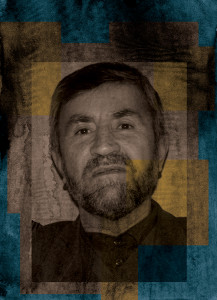Professor Seifuddin Sayhoun was one of the principal planners for the Ministry of Women’s Affairs strategy on economic rights and the security of women. He studied economics at university and started teaching at Kabul University’s Economics School in 1994. Alongside his teaching commitments, he is studying for doctorate degree at the National University of Tajikistan.
What are the important achievements of the new era in Afghanistan?
The most important achievement is the emergence of a political system. We have not had an organised political system for the past 30 years. We have not had a system of enduring institutions and representatives chosen by elections. Freedom of the press is another important development, as is the emergence of ever-growing educational institutions. Young people in Afghanistan are yearning for education and these institutions, despite all their shortcomings and defects, offer it to them. If I were to mention another development, it would be the ease with which Afghanistan is now connected to the international communication networks.
What gives you hope for the future?
What gives me hope is the people’s desire to receive education. Above all, women, young people and families have realized that they can have impact on the future if they study and acquire specialised, academic knowledge.
I also believe that the present system can be sustained so long as the Afghan army survives the 2014 transition after withdrawal of foreign troops and receives support. If so, they will be able to protect the system.
What do you fear most today?
My greatest fear is the extent to which people are disappointed and disenchanted with the present situation. Certain organisations, the media and international bodies paint an overly grim picture of the future to serve their own plans and goals. But it is true that efforts made by the people to establish justice, stability, security, and economic progress have not yet been successful. The people are very disappointed by the government’s failure to fulfil its promises to combat corruption or establish an accountable administration, to eradicate poverty, and to offer justice to victims.
Will the present-day Afghanistan allow a recurrence of the closing of schools to girls and the blocking of women’s social participation?
As I pointed out, it is a point of strength today that families have decided to hope for a bright future for their children. Surely they will not accept their children to go back to stone age.
Have the rights of women in your family been violated?
I am proud to say that it was a woman – my mother – who decided my fate. My mother sent me to school, while my father wanted to send me to a religious school. I praise her, because I was not old enough to decide. She made the decision for me. Fortunately, we all benefited from the wisdom of a woman who supported her children to continue to the highest educational levels.
These days, I owe much of my life to my wife, who is herself a well-educated woman.
What are the major demands of women?
First, women want real participation in power and politics – full participation not formal and symbolic participation. Secondly, they need an informed civil society movement to progress the attainment of their rights. It needs strong networks of women and the support of educated men. Ultimately, women want to live in equality, and to have equal opportunities to attain skills through education and professional employment.
What have you done in your personal and professional life to eliminate the obstacles including discrimination?
I am proud to say that I collaborated with other women and men in the Ministry of Women’s Affairs to develop women’s economic rights and security strategy. I have always encouraged women wherever I had a role to play. My wife is in charge of Women’s Support Bureau.
Do you have a specific message to share?
Unfortunately, policies have lacked continuity in our country. Furthermore, the civil institutions lack foundations and roots; they have limited historical experience. I hope the present conditions will continue to develop and move to advance rationality, civic ideas and beliefs in civic values.
“Unveiling Afghanistan, the Unheard Voices of Progress” is a campaign by Armanshahr and FIDH, which explores views held by Afghan civil society actors. Over 50 days, 50 influential social, political, and cultural actors hope to spark conversation and debate about building a society that is inclusive of women’s and human rights in Afghanistan.
Follow 50 interviews drawn from the “Unveiling Afghanistan campaign” daily on the Huffington Post. Follow Unveiling Afghanistan on FIDH Twitter: www.twitter.com/fidh_en


